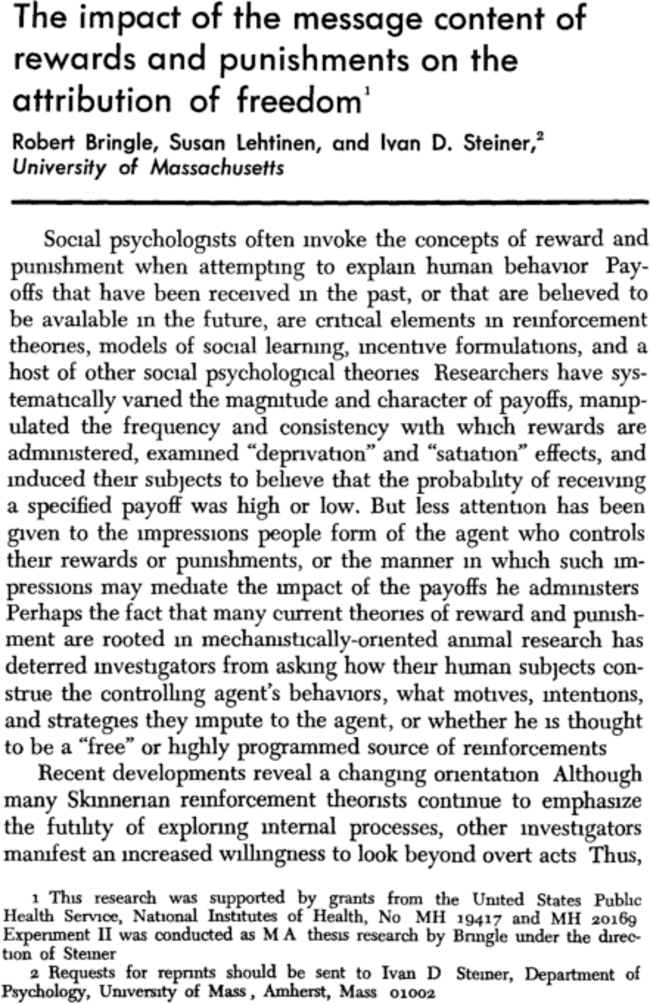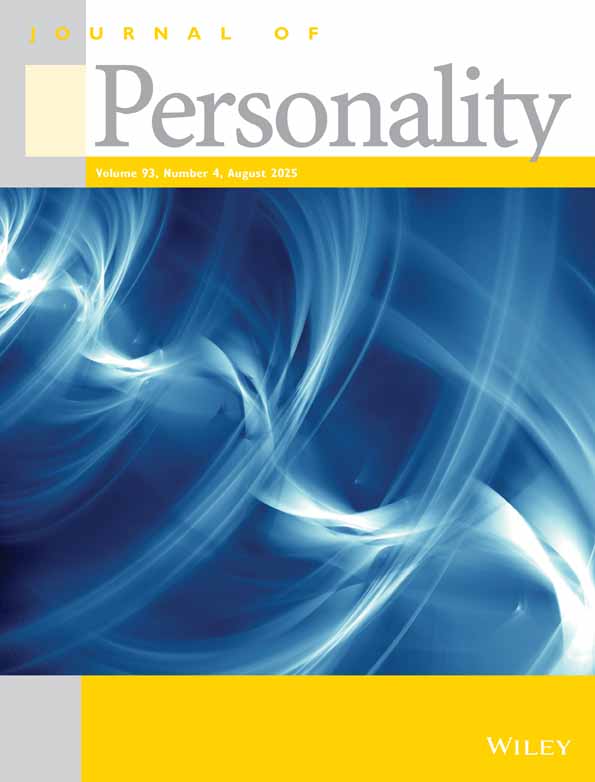Full Access
The impact of the message content of rewards and punishments on the attribution of freedom1
Robert Bringle, Susan Lehtinen, Ivan D. Steiner,
Ivan D. Steiner
University of Massachusetts
Requests for reprints should be sent to Ivan D Steiner, Department of Psychology, University of Mass, Amherst, Mass 01002
Search for more papers by this authorRobert Bringle, Susan Lehtinen, Ivan D. Steiner,
Ivan D. Steiner
University of Massachusetts
Requests for reprints should be sent to Ivan D Steiner, Department of Psychology, University of Mass, Amherst, Mass 01002
Search for more papers by this author1
This research was supported by grants from the United States Public Health Service, National Institutes of Health, No MH 19417 and MH 20169 Experiment II was conducted as M A thesis research by Bringle under the direction of Stemer

References
- Bandura, A Analysis of modeling process In A Bandura, (Ed), Theories of modeling New York Atherton Press, 1970.
- Berkowitz, L Aggression A social psychological analysis New York McGraw-Hill, 1962.
- Burnstein, E, & Worchel, P Arbitrariness of frustration and its consequences for aggression in a social situation Journal of Personality, 1962, 30, 528–540.
- Cialdim, R B, & Insko, C A Attitudinal verbal reinforcement as a function of informational consistency A further test of the two-factor theory Journal of Personality and Social Psychology, 1969, 12, 342–350.
- Cohen, A R Social norms, arbitrariness of frustration and status of the agent of frustration-aggression hypothesis Journal of Abnormal and Social Psychology, 1955, 51, 222–226.
- Davidson, A R, & Stemer, I D Reinforcement schedules and attributed freedom Journal of Personality and Social Psychology, 1971, 19, 357–366.
- Dulany, D E Hypothesis and habit in verbal “operant conditioning” Journal of Abnormal and Social Psychology, 1961, 63, 251–263.
- Goranson, R E, & Berkowitz, L Reciprocity and responsibility reactions to prior help Journal of Personality and Social Psychology, 1966, 3, 227–232.
- Jones, E E, Gergen, K J, Gumpert, P, & Thibaut, J W Some conditions affecting the use of ingratiation to influence performance evaluation Journal of Personality and Social Psychology, 1965, 1, 613–625.
- Krasner, L Verbal conditioning and psychotherapy In L Krasner and L P Ullmann, (Eds), Research in behavior modification New York Holt, Rinehart and Winston, 1965.
- Lanzetta, J T, & Hannah, T E The reinforcing behavior of “naive” trainers Journal of Personality and Social Psychology, 1969, 11, 245–252.
- Nemeth, C Effects of free versus constrained behavior on attraction between people Journal of Personality and Social Psychology, 1970, 4, 302–311.
- Orne, M T “On the social psychology of the psychological experiment With particular reference to demand characteristics and their” implications American Psychologist, 1962, 17, 776–783.
- Pastore, N The role of arbitrariness in the frustration-aggression hypothesis Journal of Abnormal and Social Psychology, 1952, 47, 728–731.
- Rosenberg, M J When dissonance fails On eliminating evaluation apprehension from attitude measurement. Journal of Personality and Social Psychology, 1965, 1, 28–42.
- Rothaus, P, & Worchel, P The inhibition of aggression under non-arbitrary frustration Journal of Personality, 1960, 28, 108–117.
- Steiner, I D Perceived freedom In L Berkowitz, (Ed), Advances in experimented social psychology, 5 New York Academic Press, 1970.
- Thubaut, J W, & Kelley, H H Authoritarianism, status, and the communication of aggression Human Relations, 1955, 8, 95–120.
-
Thibaut, J W, &
Kelley, H H
The social psychology of groups
New York
John Wiley & Sons, 1959.
10.1057/palgrave.jibs.8400327 Google Scholar
- Waller, W W, & Hill, R The family A dynamic interpretation New York , Dryden Press, 1951.




